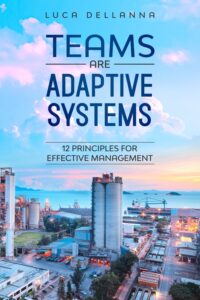Luca's monthly newsletter, on IQ, ethics, solving the right problem, and much more.
Thoughts of the Week is a review of the most interesting thoughts I encountered on Twitter and on other mediums during the last week. It is free, but if you like it, you can support me on Patreon.
1/5: Scale-dependency
“Whether something is a black swan is not only epistemically dependent, but scale dependent. Easy for an individual to see pandemic unfolding, very difficult for the global system to see it.” – Joe Norman (link)
I already wrote on Twitter (link) how one problem of centralization is sensory attunement. The centralized cannot understand what is going on at the periphery. Whereas the strong point of centralization is its capacity to pool resources (and hopefully put them to use, but that’s not a given), its weak point is definitely spotting the problems taking place at the periphery.
No matter how much you like centralization, “alarm bells” should always be deployed decentralized.
2/5: n-th order effects
“Some people think I’m scared to get the coronavirus. No I’m f*cking not. I’m assuming it’s just a matter of time before I get it. The thing is that it’s not just about myself, it’s about others, too. I’m more worried about how n-th order effects will get to me.” – Trishank Karthik Kuppusamy (link)
Two comments here. First: most people know about herd immunity in the context of vaccines. The way you protect those who cannot be vaccinated (usually because of immunodeficiency) is by vaccinating everyone else, so that they are not exposed to infected people. By some estimates, the coronavirus is about a hundred times more deadly in the elderly than in the young adult population. The way we protect them is by protecting ourselves. The less people get infected, the less people might infect the elderly.
Second: a working-age person is more likely to be hit by the pandemic indirectly than directly. Some examples: losing income because business gets bad or having to go to the urgences because of an unrelated medical condition and not finding medical staff able to attend them.
Even if you think you’re immune from dying to the coronavirus, you should still act to prevent its spread.
3/5: Impact
“The engineering mindset would rather spend £1,000 on technology than spend £1 on telling people how to use it.” – Rory Sutherland (link)
What a wasted opportunity to make an impact. A product is only as good as how people use it. Thinking that your job is only to produce a product without caring of what comes before or after is terribly ineffective. It might seem easier, but it will make everything else more difficult, as customers fail to appreciate your product and reward you with the money or word-of-mouth which you will need to progress.
4/5: Circuit breakers
Last week I was mentioning that Singapore – where healthcare is private – is fully covering coronavirus-related healthcare costs for its citizens and tourists, when I got the following reply:
“Implementation details quickly become more important than any baseline ideology.” – Jeff Lonsdale (link)
Too often we focus so much on the ideology of the implementation that we forget to include the agnostic features which are necessary.
For example:
- Healthcare might be public or private, but both need some redundancy and some circuit-breakers to react to emergencies.
- Emergency response can be more or less centralized, but both need their alarm bells to be deployed in a decentralized fashion (see point #1 of this post).
Ideologies tend to optimize for golden ages. That’s okay, but they cannot be the only point of view used to design systems.
5/5: Panic
“Preparation isn’t panic. It’s the antidote to panic.” – Kate Duxler via Joe Norman (link)
By panicking 1x today, you avoid panicking 10x tomorrow.
If you think that the groceries run last week was bad, consider that only a small percentage of the population participated in it. Imagine what would happen if everyone waited to stock-up groceries until it’s evident that they are needed, and then all converge to the grocery store on the same day?
The way you avoid big shocks is by embracing small shocks.
…
If you liked this newsletter, please share it with your friends!
They can subscribe here: luca-dellanna.com/newsletter
Otherwise, you can support me on Patreon
Become a Patron!
You might also like my books
(Here is my general disclaimer.)
The order of the thoughts only represents the order in which I encountered them, and does not imply any sort of prioritization. Quotes are edited for punctuation and grammar. Eventual formatting is mine. Also text outside of italicized quotation marks is mine. The inclusion of quotes does not imply my endorsement; merely, that they gave me food for thought. I did not optimize this review for clarity, but for its ability to spark thoughts in the reader.
9. Thoughts of The Week #57







